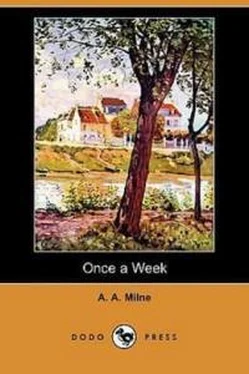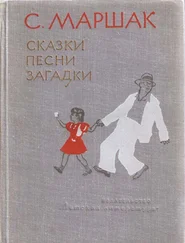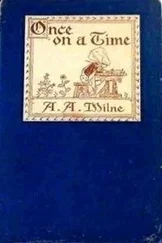Алан Милн - Once a Week
Здесь есть возможность читать онлайн «Алан Милн - Once a Week» весь текст электронной книги совершенно бесплатно (целиком полную версию без сокращений). В некоторых случаях можно слушать аудио, скачать через торрент в формате fb2 и присутствует краткое содержание. Год выпуска: 2014, Издательство: epubBooks Classics, Жанр: Юмористическая проза, на английском языке. Описание произведения, (предисловие) а так же отзывы посетителей доступны на портале библиотеки ЛибКат.
- Название:Once a Week
- Автор:
- Издательство:epubBooks Classics
- Жанр:
- Год:2014
- ISBN:нет данных
- Рейтинг книги:5 / 5. Голосов: 1
-
Избранное:Добавить в избранное
- Отзывы:
-
Ваша оценка:
- 100
- 1
- 2
- 3
- 4
- 5
Once a Week: краткое содержание, описание и аннотация
Предлагаем к чтению аннотацию, описание, краткое содержание или предисловие (зависит от того, что написал сам автор книги «Once a Week»). Если вы не нашли необходимую информацию о книге — напишите в комментариях, мы постараемся отыскать её.
Once a Week — читать онлайн бесплатно полную книгу (весь текст) целиком
Ниже представлен текст книги, разбитый по страницам. Система сохранения места последней прочитанной страницы, позволяет с удобством читать онлайн бесплатно книгу «Once a Week», без необходимости каждый раз заново искать на чём Вы остановились. Поставьте закладку, и сможете в любой момент перейти на страницу, на которой закончили чтение.
Интервал:
Закладка:
Suddenly he realised that his thoughts were wandering. With iron will he controlled them and concentrated fixedly on the word "dough–nut" for twelve minutes. Greatly refreshed, he rose and strode out into the sun.
At the door of his cottage a girl was standing. She was extremely beautiful, and Roger's heart would have jumped if he had not had that organ (thanks to Twisting Exercise 23) under perfect control.
"Is this the way to Denfield?" she asked.
"Straight on," said Roger.
He returned to his cottage, breathing heavily through his ears.
Chapter XCIII
Another Surprise
Six months went by, and the murderer of Sir Joshua Tubbs, M.P. and Sir Eustace Butt, M.P. still remained at large. Roger had sold his cottage in the country and was now in London, performing his exercises with regularity, concentrating daily upon the words "wardrobe," "dough–nut," and "wasp," and living entirely upon proteids.
One day he had the idea that he would start a restaurant in the East–End for the sale of meatless foods. This would bring him in touch with the lower classes, among whom he expected to find the assassin of his two oldest friends.
In less than three or four years the shop was a tremendous success. In spite of this, however, Roger did not neglect his exercises; taking particular care to keep the toes well turned in when lunging ten times backwards. (Exercise 17.) Once, to his joy, the girl whom he had first met outside his country cottage came in and had her simple lunch of Smilopat (ninepence the dab) at his shop. That evening he lunged twelve times to the right instead of ten.
One day business had taken Roger to the West–End. As he was returning home at midnight through Gordon Square, he suddenly stopped and staggered back.
A body lay on the ground before him!
Hastily turning it over upon its face, Roger gave a cry of horror.
It was Detective–Inspector Frenchard! Stabbed in eleven places!
Roger hurried madly home, and devised an entirely new set of exercises for his morning drill. A full description of these, however, must be reserved for another chapter.
( And so on for ever. )
Part 8
Merely Players
On the Bat's Back
With the idea of brightening cricket, my friend Twyford has given me a new bat. I have always felt that, in my own case, it was the inadequacy of the weapon rather than of the man behind it which accounted for a certain monotony of low–scoring; with this new bat I hope to prove the correctness of my theory.
My old bat has always been a trier, but of late it has been manifestly past its work. Again and again its drive over long–off's head has failed to carry the bunker at mid–off. More than once it has proved itself an inch too narrow to ensure that cut–past–third–man–to–the–boundary which is considered one of the most graceful strokes in my repertoire. Worst of all, I have found it at moments of crisis (such as the beginning of the first over) utterly inadequate to deal with the ball which keeps low. When bowled by such a ball—and I may say that I am never bowled by any other—I look reproachfully at the bottom of my bat as I walk back to the pavilion. "Surely," I say to it, "you were much longer than this when we started out?"
Perhaps it was not magnanimous always to put the blame on my partner for our accidents together. It would have been more chivalrous to have shielded him. "No, no," I should have said to my companions as they received me with sympathetic murmurs of "Bad luck,"—"no, no, you mustn't think that. It was my own fault. Don't reproach the bat." It would have been well to have spoken thus; and indeed, when I had had time to collect myself, I did so speak. But out on the field, in the first shame of defeat, I had to let the truth come out. That one reproachful glance at my bat I could not hide.
But there was one habit of my bat's—a weakness of old age, I admit, but not the less annoying—about which it was my duty to let all the world know. One's grandfather may have a passion for the gum on the back of postage–stamps, and one hushes it up; but if he be deaf the visitor must be warned. My bat had a certain looseness in the shoulder, so that, at any quick movement of it, it clicked. If I struck the ball well and truly in the direction of point this defect did not matter; but if the ball went past me into the hands of the wicket–keeper, an unobservant bowler would frequently say, "How's that?" And an ill–informed umpire would reply, "Out." It was my duty before the game began to take the visiting umpire on one side and give him a practical demonstration of the click …
But these are troubles of the past. I have my new bat now, and I can see that cricket will become a different game for me. My practice of this morning has convinced me of this. It was not one of your stupid practices at the net, with two burly professionals bumping down balls at your body and telling you to "Come out to them, Sir." It was a quiet practice in my rooms after breakfast, with no moving object to distract my attention and spoil my stroke. The bat comes up well. It is light, and yet there is plenty of wood in it. Its drives along the carpet were excellent; its cuts and leg glides all that could be wished. I was a little disappointed with its half–arm hook, which dislodged a teacup and gave what would have been an easy catch to mid–on standing close in by the sofa; but I am convinced that a little oil will soon put that right.
And yet there seemed to be something lacking in it. After trying every stroke with it; after tucking it under my arm and walking back to the bathroom, touching my cap at the pianola on the way; after experiments with it in all positions, I still felt that there was something wanting to make it the perfect bat. So I put it in a cab and went round with it to Henry. Henry has brightened first–class cricket for some years now.
"Tell me, Henry," I said, "what's wrong with this bat?"
"It seems all right," he said, after waving it about. "Rather a good one."
I laid it down on the floor and looked at it. Then I turned it on its face and looked at it. And then I knew.
"It wants a little silver shield on the back," I said. "That's it."
"Why, is it a presentation bat?" asked Henry.
"In a sense, yes. It was presented to me by Twyford."
"What for?"
"Really," I said modestly, "I hardly like― Why do people give one things? Affection, Henry; pity, generosity—er―"
"Are you going to put that on the shield? 'Presented out of sheer pity to―'"
"Don't be silly; of course not. I shall put 'Presented in commemoration of his masterly double century against the Authentics,' or something like that. You've no idea how it impresses the wicket–keeper. He really sees quite a lot of the back of one's bat."
"Your inscription," said Henry, as he filled his pipe slowly, "will be either a lie or extremely unimpressive."
"It will be neither, Henry. If I put my own name on it, and talked about my double century, of course it would be a lie; but the inscription will be to Stanley Bolland."
"Who's he?"
"I don't know. I've just made him up. But now, supposing my little shield says, 'Stanley Bolland. H.P.C.C.—Season 1912. Batting average 116.34.'—how is that a lie?"
"What does H.P.C.C. stand for?"
"I don't know. It doesn't mean anything really. I'll leave out 'Batting average' if it makes it more truthful. 'Stanley Bolland. H.P.C.C., 1912. 116.34.' It's really just a little note I make on the back of my bat to remind me of something or other I've forgotten. 116.34 is probably Bolland's telephone number or the size of something I want at his shop. But by a pure accident the wicket–keeper thinks it means something else; and he tells the bowler at the end of the over that it's that chap Bolland who had an average of over a century for the Hampstead Polytechnic last year. Of course that makes the bowler nervous and he starts sending down long–hops."
Читать дальшеИнтервал:
Закладка:
Похожие книги на «Once a Week»
Представляем Вашему вниманию похожие книги на «Once a Week» списком для выбора. Мы отобрали схожую по названию и смыслу литературу в надежде предоставить читателям больше вариантов отыскать новые, интересные, ещё непрочитанные произведения.
Обсуждение, отзывы о книге «Once a Week» и просто собственные мнения читателей. Оставьте ваши комментарии, напишите, что Вы думаете о произведении, его смысле или главных героях. Укажите что конкретно понравилось, а что нет, и почему Вы так считаете.












